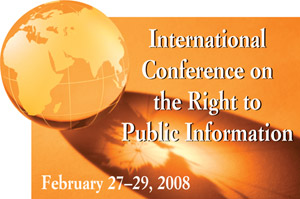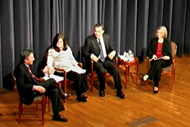International Conference on the
Right to Public Information
The Carter Center
Feb. 27-29, 2008
Read the Atlanta Declaration and Plan of Action (PDF, English) >
 After a decade of advocacy and advancement, there is a recognized need to reflect on the successes and obstacles in the access to information (ATI) field thus far and consider the emerging issues. Though there have been great advances over the past decade, much in the world has changed and there remain a number of challenges including countries without laws, patchy implementation, and some continued resistance. Numerous countries with once vibrant and robust access to information legislation are now in retreat, while the passage of new laws has slowed and implementation efforts are often insufficient. Moreover, it remains unclear that the myriad benefits of the right to information are in fact reaching the most disadvantaged people and promoting the anticipated societal transformations.
After a decade of advocacy and advancement, there is a recognized need to reflect on the successes and obstacles in the access to information (ATI) field thus far and consider the emerging issues. Though there have been great advances over the past decade, much in the world has changed and there remain a number of challenges including countries without laws, patchy implementation, and some continued resistance. Numerous countries with once vibrant and robust access to information legislation are now in retreat, while the passage of new laws has slowed and implementation efforts are often insufficient. Moreover, it remains unclear that the myriad benefits of the right to information are in fact reaching the most disadvantaged people and promoting the anticipated societal transformations.
On Feb. 27-29, 2008, the Carter Center's International Conference on the Right to Public Information gathered more than 125 representatives of diverse stakeholder groups from 40 countries to critically examine the field of access to information. During the conference, participants worked toward identifying the necessary steps and measures to ensure the effective creation, implementation, and exercise of the right of access to public information. With former U.S. President Jimmy Carter's facilitation and vision, disparate groups from around the world developed a shared agenda for the mutual advancement of the right to information and its associated benefits.
The goal of this international conference was the advancement of effective access to public information systems globally.
The main objectives of the conference were to:
1. Reflect on current worldwide status of the right to public information;
2. Consider the impact of access to information on areas such as development and governance; and
3. Explore priority actions for advancing the passage and full implementation of access to public information laws, with attention to the realpolitik considerations influencing all stakeholders.
This was accomplished through keynote speakers, panel presentations, working groups, and plenary discussion. At the conclusion of the conference, the working groups produced prioritized recommendations, which formed the framework for the Atlanta Declaration and Plan of Action for the Advancement of the Right of Access to Information.
In May 2007, The Carter Center held a two-day preparatory meeting to identify the key issues and gaps that should be addressed in the conference. The first day was spent with experts from a variety of fields related to access to information, such as persons dedicated to the more traditional field of transparency and right to information promotion, development and the pro-poor agenda, and the right to knowledge and information communication and technology. In advance of the meeting, each participant was asked to identify areas of greatest interest. Through facilitated discussion of these topics, at the conclusion of the first day six themes emerged: politics and political economy; private and non-state actors; the information environment (totality of network communications); the poor and marginalized; techniques and strategy; and evidence of impact.
On the second day, participants were joined by representatives from key donor agencies and international financial institutions to further explore these six themes and refine the conference agenda, as well as the necessary scholarship. At the conclusion of the preparatory meeting, the experts each sent a one-page document outlining the emerging trends and ideas for conference working groups.
In convening representatives from all the key stakeholder groups – governments, donors, media, civil society, private sector, and academia – the Carter Center's international conference on the right to public information addressed the fundamentally political aspects of ATI, such as the motivations of private and public actors to contribute to or impede ATI legislation and the constraints emerging from competing priorities for scarce resources. The conference concluded with the drafting of the Atlanta Declaration and Plan of Action for the Advancement of the Right of Access to Information, which offers concrete points for future consideration and action.
The first day of the conference reflected on the community of practice's experience over the past years and the state of the art of the right to information. Panelists considered the topics of access to information as a tool for socio-economic rights and development, access to information and governance, and the state of access to information around the world. The format of the first day helped to lay the foundational notion of access to information as a fundamental human right and emphasized its value beyond just the fight against corruption.
The second day of the conference was dedicated to group work. Each group was assigned one specific topic to explore:
1. Politics and Economy: shifting the balance toward openness
2. Structural and Cultural Context: creating an environment for transparency
3. Non-State and Multi-lateral Actors: examining roles and responsibilities International Norm-building: considering universal standards and a global community
4. Indicators and Measurement: demonstrating and improving impact
With strong facilitation in each working group during the conference, the participants emerged with a number of specific recommendations and action items. Under President Carter's leadership, on the third and final day, the facilitators reported back on the deliberations and findings of their working groups. From these findings and the plenary sessions, a conference declaration was drafted and distributed, and participants were provided a short opportunity to comment on the working group considerations or the document. President Carter closed the conference with a request that all participants submit their comments and suggestions for strengthening the Atlanta Declaration and Action Plan, and promised that he would review and make final edits and personally ensure the wide distribution of the Declaration to international organizations, regional bodies, and heads of state.
Following the conference, the Carter Center incorporated the substantive comments from more than 60 participants into the draft declaration. On March 26, 2008, the Center released the final version of the Atlanta Declaration and Plan of Action for the Advancement of the Right of Access to Information, which has been cited by numerous websites, blogs and newspapers, and presented to the Council of Europe's Committee on Human Rights and the Organization of American States' Committee on Political and Juridical Affairs.
We also sent out an online evaluation after the conference, and one third of the participants responded. Over 90% of respondents felt the conference did well in advancing the field of the right to information. One evaluation respondent stated that "the declaration and related documents shall be a mandatory road map for future efforts by international organizations as well as non profits interested in advancing and promoting the right of access to information."
Carter Center staff is in the process of broadly disseminating the Atlanta Declaration and producing a comprehensive conference report. The Center will continue to provide technical support and periodic updates on implementation of the recommendations, as appropriate.
Please sign up below for important news about the work of The Carter Center and special event invitations.

View Archived Webcast: Conversation at The Carter Center series, Are We Safer With Secrecy. RealPlayer is required to view the webcast.
Official Translations
Click here for pamphlet versions >
Unofficial Translations
Executive Summary
Conference Proceedings
Conference Materials
English:
Spanish:
French: